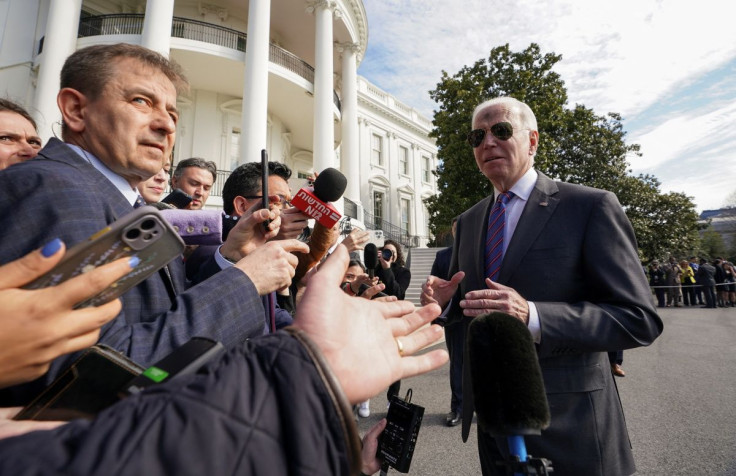Biden Administration Seeks $32.5 Billion More In Ukraine And COVID Aid

President Joe Biden's administration is seeking $32.5 billion in additional funding from Congress to bolster the U.S. COVID-19 response and help Ukraine, the White House said on Thursday.
The $22.5 billion in COVID funding plus $10 billion in emergency military and humanitarian aid for Ukraine should be included in Congress' larger spending bill to fund the U.S. government expected to come by March 11, OMB Acting Director Shalanda Young said in a statement.
Previous COVID response bills have enabled Americans to get vaccinated and tested, and allowed donations to the world. But nearly all those funds have been used, she said.
"We are therefore urging Congress to promptly provide $22.5 billion to cover immediate needs for tests, treatments and vaccines, investments in research and development of next-generation vaccines, and responding globally, including getting more shots in arms around the world," she wrote.
Both Biden's fellow Democrats, who narrowly control Congress, and Republicans strongly support humanitarian and military assistance for Ukraine. Most lawmakers had been expecting only a request of about $7 billion focused on Ukraine.
But a request that also includes more than $20 billion for COVID relief could be more difficult to pass.
"I just don't know how that's going to sort of rattle the ship," Democratic Representative Adam Smith, chairman of the House Armed Services Committee, said Thursday at the American Enterprise Institute.
Biden secured a $1.9 trillion "American Rescue Plan" last year to fight the pandemic. The Delta and Omicron coronavirus variants then helped fuel infections, hospitalizations and deaths nationwide. More than 90 percent of American Rescue Plan funds have been committed, according to sources familiar with the matter.
BILLIONS UNSPENT?
But Republicans, and some Democrats, favor an accounting of the money already allocated, with some suggesting that unspent funds be reallocated to meet new pandemic needs.
Two centrist Democrats -- Senators Joe Manchin and Jon Tester -- responded cautiously to the new COVID request. Tester told reporters he would need to see the request before supporting it. Manchin said he was willing to spend whatever it takes but added: "I want to make sure the money we've already put towards COVID has been used properly."
Republicans balked at additional COVID funds on Wednesday, when 36 Republican senators including minority leader Mitch McConnell demanded a full accounting of the money authorized so far before considering more funds.
Republican Senator Mitt Romney told Reuters on Thursday that the new White House request appeared to be appropriately targeted. But he added: "There's another issue, which is, do we have available funds from the $1.9 trillion appropriated in March that could be repurposed for the new needs?"
Senator Richard Shelby, top Republican on the Senate Appropriations Committee, told Reuters that "billions" are still available from last year's package. "We shouldn't give money where it's not needed, because we're borrowing it. We're just trying to be smart," Shelby said.
Additional COVID resources would allow the government to secure treatments, vaccines and tests for the coming months and fight future variants, OMB head Young said. The money would also ensure the continuation of free community testing, treatment and vaccination coverage for uninsured individuals.
Young cited "an immediate need" for the aid to help Ukraine and other Central European allies in the wake of the Russian invasion last week. Those funds would help train Ukraine's military, protect its electrical grid, boost its cyberdefenses and enforce sanctions, she wrote.
The White House asked Congress to approve $6.4 billion in aid to address the humanitarian and security crisis in Ukraine the day after Russia invaded on Feb 24.
© Copyright Thomson Reuters 2024. All rights reserved.





















